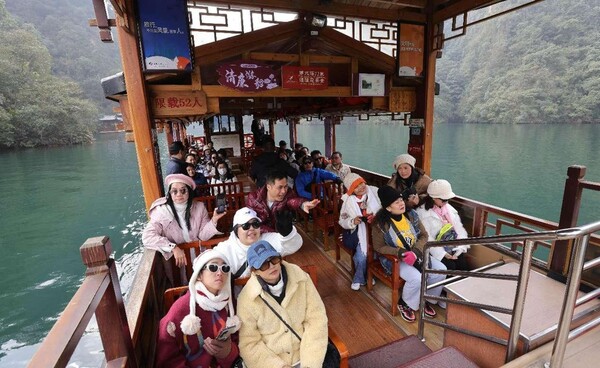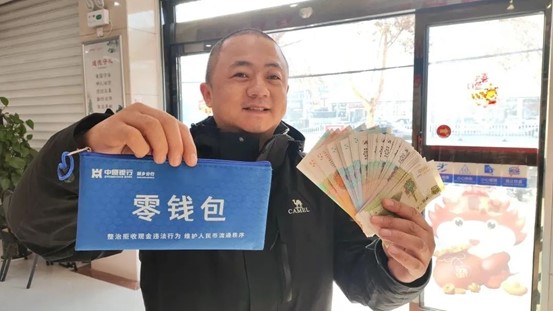By Zhao Zhanhui, People's Daily
China's State Council Information Office hosted a policy briefing on March 1, at which relevant officials from the People's Bank of China (PBOC) and other departments were invited to introduce China's efforts to optimize payment services and enhance payment convenience.
Zhang Qingsong, deputy governor of the PBOC, noted that the PBOC, in collaboration with other departments, has drafted a document on further improving payment services and enhancing payment convenience, with a focus on improving the weak links in payment services for elderly people and foreigners in China.
The document has recently been reviewed and approved by a State Council executive meeting, Zhang added.
The document highlights six key measures: promoting the usability of foreign bank cards in key places, continuously improving the cash payment environment and enhancing foreign currency exchange and cash services, making payment services more friendly to the elderly and foreigners, better protecting consumers' right to choose payment methods, encouraging banks and payment institutions to further optimize the account opening process, and carrying out diverse and targeted promotional activities.

In recent years, mobile payment has been developing rapidly in China. Yet some foreigners coming to China face challenges with mobile payment, such as the difficulty in binding their overseas bank cards and limits on spending amounts.
Zhang said the PBOC will request and instruct payment institutions such as Alipay and Tenpay to streamline their operating procedures, improve the efficiency of binding overseas bank cards, and simplify identity verification while ensuring the security of personal information.
Besides, the PBOC will also guide major payment institutions to raise the single transaction limit for overseas travelers using mobile payment from $1,000 to $5,000, and lift the annual cumulative transaction limit from $10,000 to $50,000.
According to Zhang, efforts have been made to make foreign wallet apps usable in China, and 13 such apps have been introduced to China by Alipay and Tenpay so far.
According to statistics, nearly 4 million foreigners used mobile payment in China last year, who made over 70 million transactions totaling more than 10 billion yuan ($1.39 billion).
"We highly respect the practice of foreign nationals in China making large payments using bank cards. In major commercial areas, airports, and railway stations, we are guiding commercial banks and payment institutions to expand the acceptance of foreign bank cards," Zhang said.
The PBOC is comprehensively improving foreign currency exchange, ATM cash withdrawal, and other related services.

Additionally, to address the difficulty of getting change for cash payments, it has required commercial banks to provide "change packs."
"For example, a 300-yuan pack contains nothing but small-denomination notes," said Zhang. "No matter if it's a taxi driver or a restaurant owner, they can exchange for these packs to make it easier to provide change."
Many foreign visitors to China have complained about the difficulty of using cash to pay for cultural and tourism services and products. To address the issue, China's National Development and Reform Commission, China's Ministry of Culture and Tourism, and the PBOC have jointly issued a notice requesting strict crackdowns on the refusal of cash payments in RMB. The notice aims to ensure sufficient overall cash supply and a reasonable denomination mix in major cities and tourist attractions.
Departments attending the briefing said they will implement comprehensive measures and work together to create a favorable payment environment.
Liu Bin, director general of the Current Account Management Department of China's State Administration of Foreign Exchange, said the administration will keep encouraging more foreign currency exchange institutions to provide better exchange services for foreigners coming to China, and further meet their needs for mobile payment and online consumption.
The establishment of hardware and software facilities required for mobile payment, bank cards payment and cash payment at tourist attractions will be advanced, said Shi Zeyi, a person in charge of the Bureau of International Exchange and Cooperation of China's Ministry of Culture and Tourism.
Gao Bo, a person in charge of the Transport Service Department of China's Ministry of Transport, noted that the Ministry of Transport has adopted a series of targeted measures, including accelerating the popularization of online ticketing, to facilitate both domestic and foreign nationals in purchasing tickets online using various identification documents such as ID cards, passports, and permanent residence permits.
Zhao Yang, a person in charge of the Department of Foreign Investment Administration of China's Ministry of Commerce, said the Ministry of Commerce will improve payment acceptance environment in catering and other sectors, ensuring availability of manned service and traditional payment methods. It will refine standards of the retail industry to provide diversified payment services. It will also leverage the exemplary role of international consumption center cities like Shanghai, Beijing, Guangzhou, Tianjin, and Chongqing to create a favorable payment environment.


